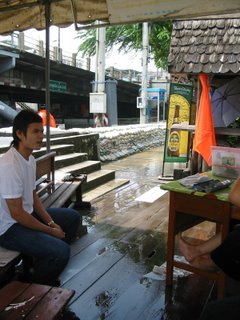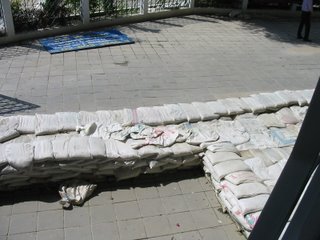Monday, November 27, 2006
Sunday, November 26, 2006
deee-licious
You may recall Aunt Who Bakes Cookies and her thwarted attempt to ensnackify the youth of Thailand.
Well, she baked another batch and sent them along with our recent guests. I have been dutifully distributing them to my students; the response seems to be positive. Some reactions:
"COLORED SUGAR?"
Well, she baked another batch and sent them along with our recent guests. I have been dutifully distributing them to my students; the response seems to be positive. Some reactions:
- Aroy! Aroy! ("Tasty! Tasty!")
- Repeated requests for seconds.
- Sooy! ("Beautiful!")
"COLORED SUGAR?"
a modern chemical wedding?
Aunt and Uncle have returned to the U.S., but before they left they gave us their collection of airline snacks from the trip to Thailand. They did what everybody does--"I'm not hungry, but I'd better grab this snack and put it away for later"--and they had quite a collection by the time they landed in Bangkok.
Some of these snacks are very weird. They are strange alliances between cookie and candy, and I have to wonder who decided they were necessary additions to the standard snacking repertoire.
For example: an Oreo candy bar. An Andes (as in, the little foil-wrapped mints, not the South American mountain range) cookie. This is food with an identity crisis.
(Postscript: Sometimes typos have real meaning--I originally typed "identity crusis!")
Some of these snacks are very weird. They are strange alliances between cookie and candy, and I have to wonder who decided they were necessary additions to the standard snacking repertoire.
For example: an Oreo candy bar. An Andes (as in, the little foil-wrapped mints, not the South American mountain range) cookie. This is food with an identity crisis.
(Postscript: Sometimes typos have real meaning--I originally typed "identity crusis!")
the river is moving / the blackbird must be flying



After a very heavy rainy season in Thailand, the Chao Praya River is dangerously high. There have been floods all the way from the north of Thailand to the coast, and in Bangkok there are still some streets under water, even though it stopped raining in any serious way weeks ago.
These are some pictures I took recently. Note the sandbags; also note the level of the floating pier (at the top of the ramp in the first picture). Normally one walks down a ramp to reach it.
Friday, November 24, 2006
learn thai in one easy lesson
Aunt and Uncle are here in Bangkok for a visit and for a professional conference. Although they've traveled a lot, they've never been to Thailand, and when they arrived they asked me to write down some key phrases in Thai: hello, good-bye, thank you, that sort of thing.
I did, but then I suggested to Aunt that she could make things easier on herself by doing the following:
Mumble something, and follow it with "ka." (The polite particle used by women.)
She's been trying it, and apparently it's been working like a charm!
I did, but then I suggested to Aunt that she could make things easier on herself by doing the following:
Mumble something, and follow it with "ka." (The polite particle used by women.)
She's been trying it, and apparently it's been working like a charm!
Thursday, November 23, 2006
i'm scratching my head here
My students have really different ideas than I do about when to show up for things.
When Husband and I got back from New Zealand, there was still about a week left before the start of the new semester. We both headed into our offices to make our preparations. The very first day back, I saw one of my students. He was so happy to see me! He said, "Ajarn, I have been coming to your office every day of this holiday. I have been looking for you every day." I asked, "Didn't you get my email that I'd be out of the office until today, and that if you needed me you should send an email?" He responded, "Yes."
They continue to believe that I understand no Thai at all, and when someone doesn't show up for a rehearsal or class they talk amongst themselves about what story to cook up for me. Someone volunteers that the missing student is downstairs eating; someone else says that they should tell me he's sick; I chime in, in Thai, to let them know I've understood the whole exchange. All of them collapse in horrified giggles. Every. Single. Time.
A student informed me this week that she would never be able to come to my 12:00 class. Why? Because she has a class that ends at 11:50 and another one that starts at one. So as I could plainly see (?), there was absolutely no way she could squeeze in another class. I told her I'd see her in class.
A group of students is entering an ensemble competition this week. Yesterday they asked me if they could ALL skip my pedagogy class to rehearse. When I said no, they acted extremely hurt. Turns out, they didn't want just to skip class--they wanted me to cancel class so I could help them practice.
This is after weeks and weeks of this exchange:
I went home.
She told me they were practicing again at 8 this morning; I told her I'd be there. We'll see.
When Husband and I got back from New Zealand, there was still about a week left before the start of the new semester. We both headed into our offices to make our preparations. The very first day back, I saw one of my students. He was so happy to see me! He said, "Ajarn, I have been coming to your office every day of this holiday. I have been looking for you every day." I asked, "Didn't you get my email that I'd be out of the office until today, and that if you needed me you should send an email?" He responded, "Yes."
They continue to believe that I understand no Thai at all, and when someone doesn't show up for a rehearsal or class they talk amongst themselves about what story to cook up for me. Someone volunteers that the missing student is downstairs eating; someone else says that they should tell me he's sick; I chime in, in Thai, to let them know I've understood the whole exchange. All of them collapse in horrified giggles. Every. Single. Time.
A student informed me this week that she would never be able to come to my 12:00 class. Why? Because she has a class that ends at 11:50 and another one that starts at one. So as I could plainly see (?), there was absolutely no way she could squeeze in another class. I told her I'd see her in class.
A group of students is entering an ensemble competition this week. Yesterday they asked me if they could ALL skip my pedagogy class to rehearse. When I said no, they acted extremely hurt. Turns out, they didn't want just to skip class--they wanted me to cancel class so I could help them practice.
This is after weeks and weeks of this exchange:
- Ajarn, can you help us?
- Sure! Just tell me what time you're going to rehearse and I'll be there.
- Don't know. I tell you again. ("again" is what they always say instead of "later")
- silence
I went home.
She told me they were practicing again at 8 this morning; I told her I'd be there. We'll see.
Monday, November 20, 2006
yeah, they'll confiscate those at the border
Master's students here have to write what's called a "thematic paper." This is a brief (like, 10 or 15 pages) description of the music they're going to play at their degree recital. It's an uneasy compromise between the college of music administration (who'd prefer a U.S.-style degree that includes only recitals and no paper at all) and the university administration (who mandate that all master's degrees include a thesis). It has to be written in English.
As the only native English speaker in my department, I'm always asked to look at these papers for language. As a functioning member of my very small department, I (along with my colleagues) also serve as a committee member, making comments on content, format, and other issues.
The students tend to forget that second part--they figure I'm the English expert and nothing else.
Recently I read a draft of one of these papers. It wasn't bad. It was cursory, as such a short paper must be, and it included all of the common English errors that Thai people make (verb tenses that don't match, words like articles left out, and, for some reason, writing "c" for "z"--I don't understand that one). But the information was good, for the most part, and I was pleased that the student had done some good research. That's hard to do here, since the library is a big, beautiful, empty building...but that's another story for another day.
Unfortunately there was a really big problem with the paper: it included NOT ONE SINGLE CITATION. There was a brief bibliography (about 5 works, including a basic music history textbook and a music encyclopedia, which, again, is a whole other problem), but nothing in the paper to show the sources of this student's information...most of which, I can tell you for sure, is too obscure to have come from the general sources in his bibliography.
Before I met with this student I showed the paper to the head of academic affairs to talk about citation and the kind of training this student would have had in the proper way to do these things. Turns out he has passed a class in it (like bibliography in the U.S. but called research methods here) and should know very well that this is a big problem.
I met with the student and started to take him through my comments. I pointed out every single place where there should be a citation. He nodded at the first few, but after a page or so he began to look really uncomfortable. He started to make excuses.
He'd learned some information directly from his teacher and didn't know how to cite that. He'd given a bibliography at the end of the paper--wasn't that enough? Some of his sources weren't as well-known as these general books--he thought listing them would make him look bad.
And then, the crowning jewel of bs excuses.
"Footnotes are not allowed in Thailand."
I was speechless.
As the only native English speaker in my department, I'm always asked to look at these papers for language. As a functioning member of my very small department, I (along with my colleagues) also serve as a committee member, making comments on content, format, and other issues.
The students tend to forget that second part--they figure I'm the English expert and nothing else.
Recently I read a draft of one of these papers. It wasn't bad. It was cursory, as such a short paper must be, and it included all of the common English errors that Thai people make (verb tenses that don't match, words like articles left out, and, for some reason, writing "c" for "z"--I don't understand that one). But the information was good, for the most part, and I was pleased that the student had done some good research. That's hard to do here, since the library is a big, beautiful, empty building...but that's another story for another day.
Unfortunately there was a really big problem with the paper: it included NOT ONE SINGLE CITATION. There was a brief bibliography (about 5 works, including a basic music history textbook and a music encyclopedia, which, again, is a whole other problem), but nothing in the paper to show the sources of this student's information...most of which, I can tell you for sure, is too obscure to have come from the general sources in his bibliography.
Before I met with this student I showed the paper to the head of academic affairs to talk about citation and the kind of training this student would have had in the proper way to do these things. Turns out he has passed a class in it (like bibliography in the U.S. but called research methods here) and should know very well that this is a big problem.
I met with the student and started to take him through my comments. I pointed out every single place where there should be a citation. He nodded at the first few, but after a page or so he began to look really uncomfortable. He started to make excuses.
He'd learned some information directly from his teacher and didn't know how to cite that. He'd given a bibliography at the end of the paper--wasn't that enough? Some of his sources weren't as well-known as these general books--he thought listing them would make him look bad.
And then, the crowning jewel of bs excuses.
"Footnotes are not allowed in Thailand."
I was speechless.
Saturday, November 11, 2006
oh, woe is me
hack, hack, cough
Again.
You know those symptoms on the Nyquil commercial? I've got them all.
Why do Thailand germs hate me?
Again.
You know those symptoms on the Nyquil commercial? I've got them all.
Why do Thailand germs hate me?
Thursday, November 09, 2006
it's starting already
Dear Students,
Not everyone can have a lesson on Friday. Each Friday contains only 24 hours, you see, and believe it or not I need some of those hours for sleeping, eating, peeing, and PREPARING FOR YOUR LESSONS!!
Are you sure I can't interest you in Wednesday? How about Tuesday? I have some lovely Monday in your size. In fact, you'll even note that Mondays are seven days apart, JUST LIKE FRIDAYS. Believe it or not, that means you'll have exactly as much practice time between lessons as you would if your lesson was on the coveted Friday.
Sincerely,
maikaojai
Not everyone can have a lesson on Friday. Each Friday contains only 24 hours, you see, and believe it or not I need some of those hours for sleeping, eating, peeing, and PREPARING FOR YOUR LESSONS!!
Are you sure I can't interest you in Wednesday? How about Tuesday? I have some lovely Monday in your size. In fact, you'll even note that Mondays are seven days apart, JUST LIKE FRIDAYS. Believe it or not, that means you'll have exactly as much practice time between lessons as you would if your lesson was on the coveted Friday.
Sincerely,
maikaojai
Sunday, November 05, 2006
clarification
Husband informs me that the guy who asked him about drinking beer on a bus wasn't just wondering--he was holding a jumbo bottle of Heineken wrapped in a paper bag at the time. Clearly he faced a dilemma--he could:
- Finish his beer first, thereby staying out in the heat and potentially missing his bus.
- Refrain from drinking on the bus, thereby allowing his beer to get warm (which takes about 30 seconds in this climate).
- Drink the beer on the bus, happily solving his problem but risking the disapproval of the ticket-taker.
there are no words
Friday, November 03, 2006
cut the frabba-jabba
After I came back from Country Bordering Thailand, I jumped right into my next project. I played in the pit orchestra with a New York-based touring company of West Side Story.
By the time they got to Bangkok they'd been on tour for several months. They had been all over Asia and Europe, and Bangkok was their last stop before going home.
The way that these companies usually operate is, they hire a cast, a conductor, a few key stage crew members (I don't know enough about it to tell you their job titles), and a few core pit musicians (in the case of West Side Story, a bassist, a drummer, a pianist, a concertmaster, a lead trumpet player, and three woodwind doublers). Then they fill out the orchestra and the crew by hiring locals in each city they come through. It's cheaper for them, and at least in major cities in the U.S., there are musicians who make a living just by doing these kinds of gigs.
So the rest of the pit (and by today's Broadway standards it's a HUGE orchestra) was filled out by my colleagues and members of the orchestra I used to play in. I played clarinet, E-flat clarinet, and bass clarinet in the show. It was my first experience with doubling outside of a symphony orchestra, which is a whole different ballgame, and my learning curve was steep. After a rehearsal or two, though, I was doing about as well as I was going to do. Until.
In several of the numbers, I had to play all three instruments with very little time to change. I'd have the bass clarinet leaning on my shoulder, the B-flat clarinet in my hand, and the E-flat clarinet on a peg, waiting to be grabbed. I would keep a mouthpiece cover on instruments I wasn't currently using, to prevent the reeds from drying out/getting smacked and broken by me or the guy sitting next to me. Well, in rehearsal, with the bass clarinet ready (on my shoulder) and the B-flat clarinet in my hand, I made a quick change. I picked up the E-flat clarinet...pulled off the mouthpiece cover...and watched in horror as my ligature came off with it. Once the ligature is off, there's nothing holding the reed on, so the reed slid off...and into the bell of the bass clarinet.
This is why I'm not a freelance musician in New York City.
I missed the E-flat entrance, of course, and then my next bass clarinet entrance (only a few seconds later) because I was so flustered, but I made my next one, which was B-flat. For the rest of the number I sat out the E-flat entrances (no time to put on a new reed), and crossed my fingers while playing the bass, that the presence of an E-flat clarinet reed INSIDE THE INSTRUMENT wouldn't affect the sound too much. When the number was over I horrified the guy sitting next to me by taking apart my bass clarinet to get at the reed that had fallen into it while he was too busy doing his job to notice.
Now I want to tell you about the guy sitting next to me. He, and two others in the show, are woodwind doublers. This is a really specialized profession, useful only in this type of musical and in certain jazz situations. These guys can play anything. In this show, one of them played piccolo, flute, clarinet, and alto saxophone. Another played piccolo, flute, clarinet, bass clarinet, tenor saxophone, and baritone saxophone. And the third played piccolo, flute, clarinet, bass clarinet, soprano saxophone, and bass saxophone. They were making fast changes just like I was, but they were doing it on six instruments instead of three, and the instruments they were playing were not nearly so closely related as mine were.
("Cut the frabba-jabba" is a line from the show. They say it twice, and it's just such a funny line--what does it mean, anyway?-- that it stuck in my head.)
By the time they got to Bangkok they'd been on tour for several months. They had been all over Asia and Europe, and Bangkok was their last stop before going home.
The way that these companies usually operate is, they hire a cast, a conductor, a few key stage crew members (I don't know enough about it to tell you their job titles), and a few core pit musicians (in the case of West Side Story, a bassist, a drummer, a pianist, a concertmaster, a lead trumpet player, and three woodwind doublers). Then they fill out the orchestra and the crew by hiring locals in each city they come through. It's cheaper for them, and at least in major cities in the U.S., there are musicians who make a living just by doing these kinds of gigs.
So the rest of the pit (and by today's Broadway standards it's a HUGE orchestra) was filled out by my colleagues and members of the orchestra I used to play in. I played clarinet, E-flat clarinet, and bass clarinet in the show. It was my first experience with doubling outside of a symphony orchestra, which is a whole different ballgame, and my learning curve was steep. After a rehearsal or two, though, I was doing about as well as I was going to do. Until.
In several of the numbers, I had to play all three instruments with very little time to change. I'd have the bass clarinet leaning on my shoulder, the B-flat clarinet in my hand, and the E-flat clarinet on a peg, waiting to be grabbed. I would keep a mouthpiece cover on instruments I wasn't currently using, to prevent the reeds from drying out/getting smacked and broken by me or the guy sitting next to me. Well, in rehearsal, with the bass clarinet ready (on my shoulder) and the B-flat clarinet in my hand, I made a quick change. I picked up the E-flat clarinet...pulled off the mouthpiece cover...and watched in horror as my ligature came off with it. Once the ligature is off, there's nothing holding the reed on, so the reed slid off...and into the bell of the bass clarinet.
This is why I'm not a freelance musician in New York City.
I missed the E-flat entrance, of course, and then my next bass clarinet entrance (only a few seconds later) because I was so flustered, but I made my next one, which was B-flat. For the rest of the number I sat out the E-flat entrances (no time to put on a new reed), and crossed my fingers while playing the bass, that the presence of an E-flat clarinet reed INSIDE THE INSTRUMENT wouldn't affect the sound too much. When the number was over I horrified the guy sitting next to me by taking apart my bass clarinet to get at the reed that had fallen into it while he was too busy doing his job to notice.
Now I want to tell you about the guy sitting next to me. He, and two others in the show, are woodwind doublers. This is a really specialized profession, useful only in this type of musical and in certain jazz situations. These guys can play anything. In this show, one of them played piccolo, flute, clarinet, and alto saxophone. Another played piccolo, flute, clarinet, bass clarinet, tenor saxophone, and baritone saxophone. And the third played piccolo, flute, clarinet, bass clarinet, soprano saxophone, and bass saxophone. They were making fast changes just like I was, but they were doing it on six instruments instead of three, and the instruments they were playing were not nearly so closely related as mine were.
("Cut the frabba-jabba" is a line from the show. They say it twice, and it's just such a funny line--what does it mean, anyway?-- that it stuck in my head.)
Thursday, November 02, 2006
and we wonder why we have a bad reputation
The other day, Husband was walking down the street in our town. He was stopped by a guy he describes as looking "like an American tourist" (rare enough here--they don't usually venture this far out of Bangkok except to go to the beach), with a scruffy stubble.
Tourist Guy: Do you speak English?
Husband: Yeah.
Tourist Guy: Can I drink beer on a bus?
Tourist Guy: Do you speak English?
Husband: Yeah.
Tourist Guy: Can I drink beer on a bus?
Subscribe to:
Posts (Atom)
